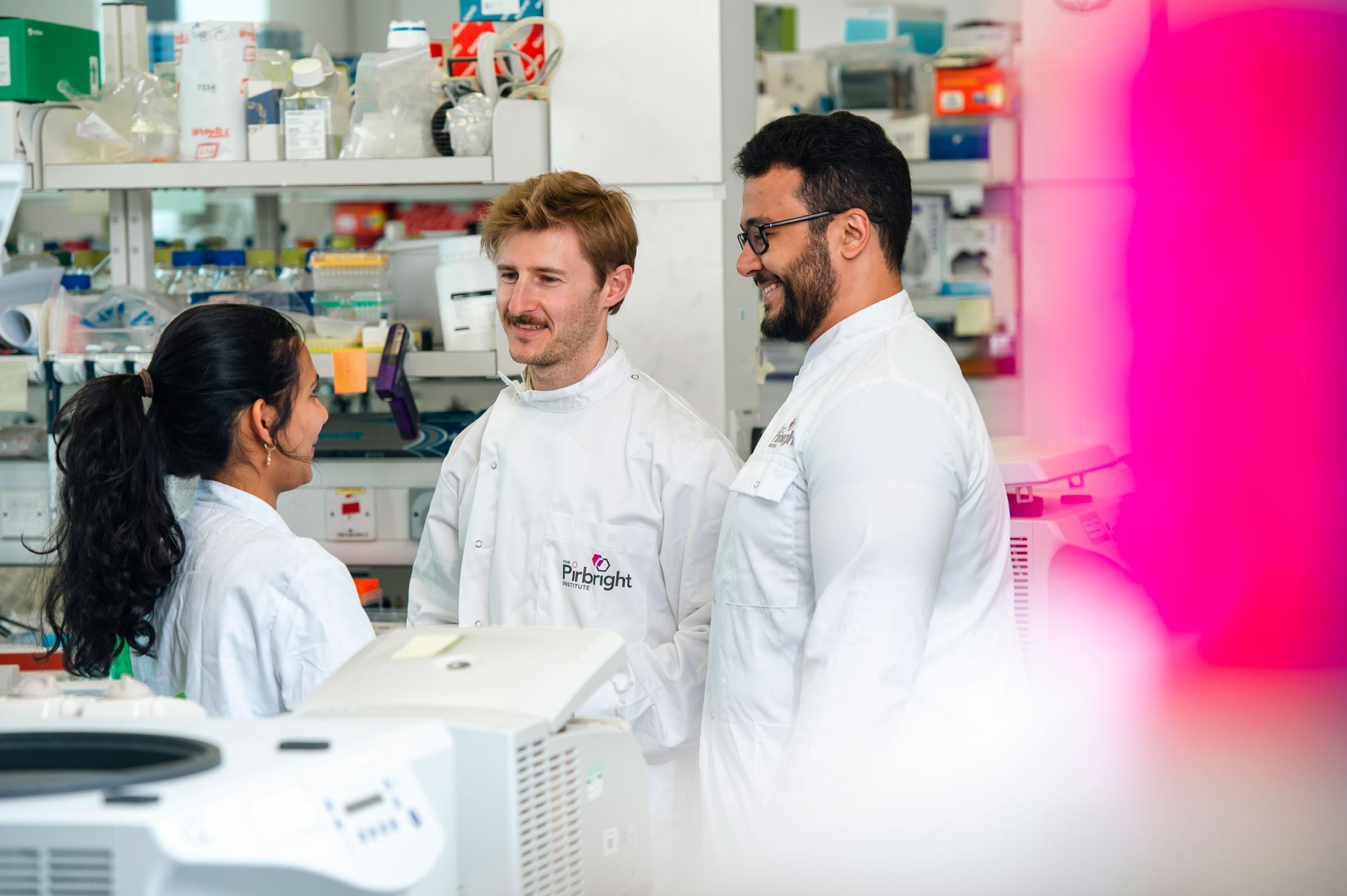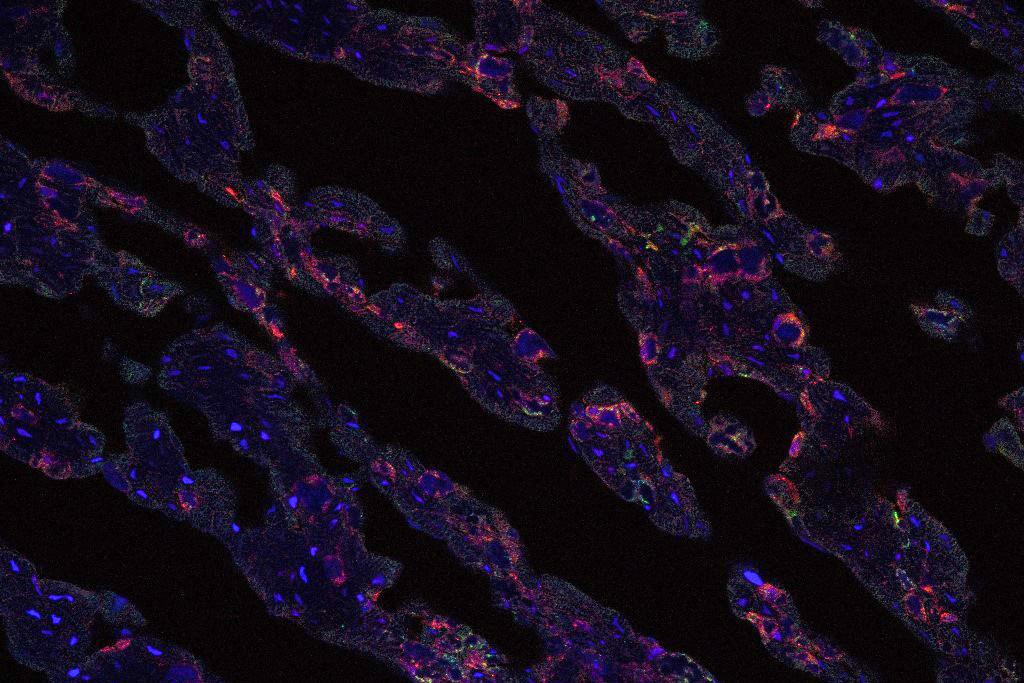In these short spotlights, some our PhD students share what they’re researching, how they came to join The Pirbright Institute, and what life is really like here. From breakthroughs in the lab to the challenges and rewards of postgraduate study, discover the stories behind the science.
Abdelaziz Yassin
Abdelaziz is a final year student, registered with the University of Surrey.
I have always been fascinated by viruses - how such small entities can have massive impacts on populations. After completing my undergraduate degree in veterinary medicine, I pursued a Master's in Virology, which deepened my interest in viral pathogenesis and vaccine development. I decided to pursue a PhD to contribute to infectious disease research, especially in the context of animal health and zoonoses.
I chose Pirbright because of its international reputation in animal virus research and its state-of-the-art facilities for high containment work. The chance to be mentored by leading virologists in foot-and-mouth disease and work with cutting-edge tools and resources was a key deciding factor.
My project has looked at developing a tool to differentiate between different serotypes of FMD. FMD is endemic in Egypt and causes drastic economic losses so proper diagnosis leads to effective control.
The most rewarding part of my PhD is being able to satisfy my curiosity and to experience the mystery of the next step in the project. Being away from my family in Egypt is challenging but I keep in contact, and it helps that I have my wife and daughter with me.
I have great support from my supervisors, our Academic Affairs Manager Yvonne (Academic Affairs Manager) and my funders.
Over the course of my PhD, I’ve learned how to manage a complex project independently, developed scientific communication abilities and become more resilient in the face of stress. I’ve also realised that there is no end for science - even though my project will conclude, the questions will keep coming.
Life at Pirbright has been very peaceful and productive. My family enjoy the gardens and open spaces. Outside of project, I make an effort to separate my working and non-working days. I play football, read, go to the gym, and use Sundays to reset for the week ahead.
Looking ahead, I want to continue in academia with a postdoctoral position in virology. My advice for anyone starting a PhD is: be confident in your decision, commit fully, and make the most of every opportunity - from seminars and training to Student Club and public engagement events.
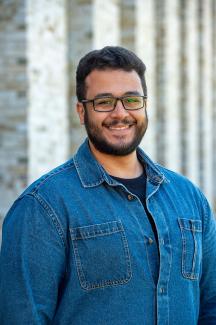
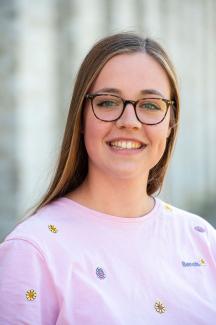
Adriana Tubb
Adriana is a 2nd year PhD student, registered with the University of Surrey.
My project studies viruses of high medical importance in the world today - dengue and Zika virus. My primary focus is looking at the structure of their genetic material to understand how these viruses commandeer the host system to replicate and spread. Part of this includes investigating the host immune system to dissect how these viruses can go under the radar and cause severe symptoms.
I wanted to do to do a PhD since I was in year 7 at secondary school – I’ve always loved science. I did an undergraduate degree in Biomedical Sciences at Royal Holloway, University of London then stayed to complete a Master’s degree in Molecular Neuroscience. I enjoyed the molecular side of my master’s project but wanted to explore another field, so I chose a molecular-based PhD in virology. I didn’t take a break between degrees because I wanted to complete my education in one go and avoid losing momentum.
I applied for several PhD projects and even received an offer to stay at Royal Holloway, however I chose Pirbright for the chance to branch out and gain new experiences, both in industry and academia. Here, I’ve been able to present at conferences, take part in public outreach, and even mentor a placement student – an experience that’s made me consider teaching in the future.
The most challenging part of my PhD is troubleshooting experiments whilst maintaining the motivation and resilience to continue. Luckily, I have four supervisors, my lab group, and the small, but close, student network who are all really supportive, as are my family – my sister, who I live with, is also doing a PhD in biology. My main supervisor is especially helpful and talks me through how I can improve experiments or iron out any issues.
My PhD has helped me grow my confidence in both my work and my personal life, I can now go and ask a question without doubting myself.
Outside of work, I maintain a strong work-life balance. Driving home helps me switch off and leave work at work. I spend time with friends at weekly dinner nights, play D&D, and plan to start tap dancing again.
I’m not entirely sure what’s next, but I’m interested in staying in academia while also keeping an open mind about industry opportunities. My advice to others is to remember that a Pirbright PhD is more like a 9–5 job than a traditional university course. It’s fast-paced and demanding, but the support, skills, and opportunities make it worth it.
Alex Norman
Alex is an Industrial Case student in his 3rd year.
I started my PhD in 2020 as part of the Oxford Doctoral Training Programme (DTP), right in the middle of the COVID-19 pandemic. My original project focused on developing high-throughput screening platforms to identify and characterise neutralising antibody responses to viral pathogens. In 2022 I took a two-year break to pursue a career opportunity. When I returned, I converted to an ICASE (Industrial case) studentship, with a new focus on engineering antibodies in the lab that can neutralise viruses more effectively than the body’s own immune system.
One of the things that inspired me to do a PhD was reading ‘The Emperor of all Maladies’ by Siddhartha Mukherjee. It’s both a history of cancer research as well as a human story about scientists, doctors and patients. I liked the combination of head and heart and doing something impactful.
My original programme at Oxford involved the completion of two rotations before choosing the main project. However, after my two rotations I felt that neither the lab nor project was quite right for me. I came up with a new research idea, wrote a two-page proposal, and sent it around. That’s how I connected with my current supervisor, Dalan Bailey, who was immediately supportive.
One of the most exciting parts of my PhD is having complete ownership and intellectual and creative freedom. However, that independence can also be challenging - when motivation dips, there’s no one telling you to speed up. Setting my own internal deadlines helps, as does having had the chance to mentor a master’s student, which was both rewarding and insightful.
I’ve had excellent support from my primary supervisor Dalan Bailey and Co-Supervisor Tom Peacock, as well as from the Academic affairs team who put student welfare first.
Outside of the lab, I like to stay busy with hobbies that challenge me – from piano and water sports to dance and language learning. They’ve given me confidence in my ability to adapt, excel at different things, and connect with a wide range of people.
After my PhD, I’m considering returning to the biotech world, possibly at the US start-up I helped establish. My advice to future students is to get at least a year of lab experience before starting a PhD, explore different paths, and build a community both inside and outside of work.
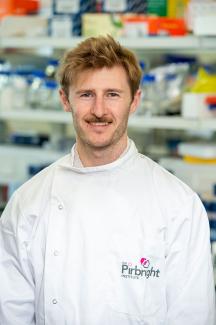
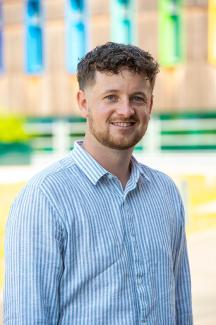
Luke O'Neill
Luke is a 3rd year PhD student split between Pirbright and City St Georges, University of London.
In my PhD project I’m studying Rift Valley fever, a vector-borne disease endemic to large parts of Africa and the Arabian Peninsula. Vector population sizes are largely driven by rainfall because the temperature is hot enough for mosquitoes all year round. Livestock act as a reservoir of Rift Valley fever with spillover into human populations. It’s a great example of the One Health approach, which recognises the close links between animal, human, and environmental health.
My interest in science started when I was quite young. Watching my grandparents’ illnesses and seeing treatments fail made me want to understand how infections work and how we can do better.
I studied Medicinal Chemistry at university and developed a particular interest in antimicrobial resistance (AMR). This led me to job roles in drug discovery and optimisation, and later a master’s in One Health. I wanted a PhD project that combined zoonotic and AMR elements but also gave me the chance to operationalise One Health – linking science directly to real-world impacts.
In my project for RVF, I’ve built linked mathematical models for livestock and human populations, driven by environmental factors like rainfall, which influence mosquito populations. These models simulate disease progression through Susceptible, Exposed, Infected, and Recovered compartments, with livestock–human transmission linked via force of infection calculations. Alongside this, I’ve developed an economic model to assess the cost-effectiveness of different vaccination strategies, weighing health benefits against outbreak and vaccine costs. I’ve also explored the wider societal impacts of RVF, including socio-economic factors and gender inequality.
Modelling is both challenging and rewarding. Writing code and observing the model run smoothly brings a strong sense of achievement, but there is real creativity required in structuring, writing functions and visualising outputs.
I’ve been fortunate to have four supportive supervisors who encourage me to seek extra training – such as courses in MATLAB, mathematical modelling, and health economics – and to explore networking opportunities. Attending conferences, travelling, and even participating in a policy workshop at Cambridge have broadened my perspective on how research can influence policy.
I live offsite with my partner and maintain a healthy work–life balance, teaching part-time, socialising with friends in London, and spending time outdoors. Looking ahead, I’d be interested in a postdoc, possibly at Pirbright, to build on what I’ve learned.
This PhD has been a lesson in independence, resilience, and critical thinking. For me, One Health research is about embracing complexity – every answer raises better questions, and that’s what makes it so rewarding.
Soumya Sharma
Soumya is a second year PhD student registered with the University of Edinburgh (The Roslin Institute).
My project focuses on cattle and a particular immune cell called Natural killer (NK) cells, exploring the diversity of these cells and how this diversity helps them perform their function.
Before starting my PhD, I did an integrated masters in Applied Biological Research at the Royal Veterinary College (RVC) with my Master’s year industrial placement at GSK. I also undertook a multi-department internship at a GLP-certified contract research organisation, gaining experience in preclinical research and discovery biology before starting my PhD.
I wanted to do a PhD because I want to pursue a career in veterinary research and was further inspired by the lectures at the RVC. I also wanted to develop a strong foundation in theoretical and research techniques, explore my scientific curiosity and become an independent thinker.
Across both Roslin and Pirbright, I have five extremely supportive supervisors who have consistently helped, guided and motivated me. At Pirbright, I’m part of a welcoming team where I can ask questions without judgment.
Weekly check-ins, monthly lab meetings, and visits to Edinburgh have kept me on track, expanded my network, and given me the chance to learn about exciting new research. Conferences, seminars, and conversations with world-leading scientists have been invaluable for expanding my understanding of the field.
A key challenge in my PhD has been dealing with experiments that don’t go as expected. It can lead to self-doubt and uncertainty, especially when the outcomes aren’t clear. However, these experiences have taught me resilience, troubleshooting and planning skills as well as the value of perseverance in research. A piece of advice from a postdoc has stayed with me: “You need to have the willingness, interest and curiosity to learn. Skills can be taught, but you can’t be taught how to learn or be curious”.
As an international student, the visa process can be quite stressful but the University of Edinburgh who sponsored my visa, made it straightforward. Pirbright offers subsidised student housing just a ten-minute walk from the Institute, which is convenient and peaceful, though a little isolated without a car. To keep a healthy balance, I make time for dance classes twice a week, go to the gym before work, and socialise with friends both inside and outside the institute.
I’m not yet certain exactly where I’ll go after my PhD, but I know I want to stay in research, ideally in academia, perhaps through a postdoctoral role.
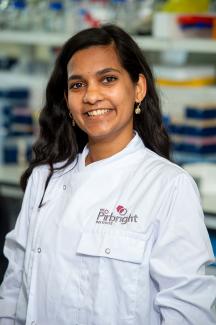
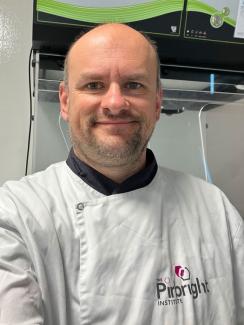
Tomasz Zaleski
Tomasz is a 3rd year student, employed by the Animal and Plant Health Agency (APHA).
I graduated from university in Poland as a veterinarian surgeon and came to the UK in 2006 to work as a vet. I was inspired to do a PhD as I have always been curious about where things come from and how things work in nature.
My project is jointly run by three organisations - APHA, University of Cambridge and The Pirbright Institute. It focuses on understanding more about Seneca Valley virus, a picornavirus which causes disease in pigs and is clinically undistinguishable from foot-and-mouth disease. I am studying the aftermath of cases that has been experienced by the British pig industry over the summer in 2022, assessing the current situation, exploring the potential for monitoring and surveillance measures, as well as understanding more about virus biology and environmental survivability.
The most exciting part of my PhD so far has been successfully running my first PCR reaction entirely on my own. Coming from no prior lab experience, I've built my lab skills over the past year and a half by working independently in a high-containment lab and even had the opportunity to design my own animal experiments.
The laboratory remains a fascinating and challenging environment for me – I am constantly learning new techniques, technologies, concepts and ideas. I’ve also found seminars and scientific meetings at Pirbright invaluable for my development, offering opportunities to connect with leading experts in their fields.
I have found the most challenging parts of my PhD have been making sure I have time to spend with my wife and two daughters, reshaping my professional path, and adapting to new environments. While there have been ups and downs, fortunately, family life hasn’t been significantly impacted, and it has been a rewarding journey.
I stay in Pirbright’s student housing during the week but travel home at weekends, which, although tiring, gives me time to reflect and enjoy some space to myself.
I've received strong support from APHA, the university and The Pirbright Institute, particularly from my supervisors and the Academic Affairs team, who have taken a very personal and supportive approach. Overall, it feels remarkable to be in this place at this time, surrounded by such expertise and opportunities to grow.
